The Relationship Between Christianity and Psychology
VerifiedAdded on 2022/10/14
|10
|1999
|52
Essay
AI Summary
This essay explores the intricate relationship between Christianity and psychology, emphasizing the integrative view and the allies model as a primary method of understanding. The paper begins by highlighting the importance of examining this relationship and then delves into various methods of knowing, with a focus on the allies model. This model, rooted in the belief of a sovereign God, attempts to bridge the gap between faith-based and science-based perspectives. The essay describes the allies model, contrasting it with other approaches like enemies, spies, and neutral parties, and discusses its strengths, such as its ability to integrate faith and psychology, and its limitations, including the potential for overemphasis on God's role. The paper analyzes the viewpoints presented in works by Entwistle and Johnson, further solidifying the importance of the allies model. The conclusion underscores the relevance of the allies model for Christians today and the value of integrating psychology and faith for a more comprehensive understanding of human nature. The essay references key scholarly works to support its arguments.

Running head: SOCIOLOGY 1
Sociology
Student Name
Institution
Sociology
Student Name
Institution
Paraphrase This Document
Need a fresh take? Get an instant paraphrase of this document with our AI Paraphraser
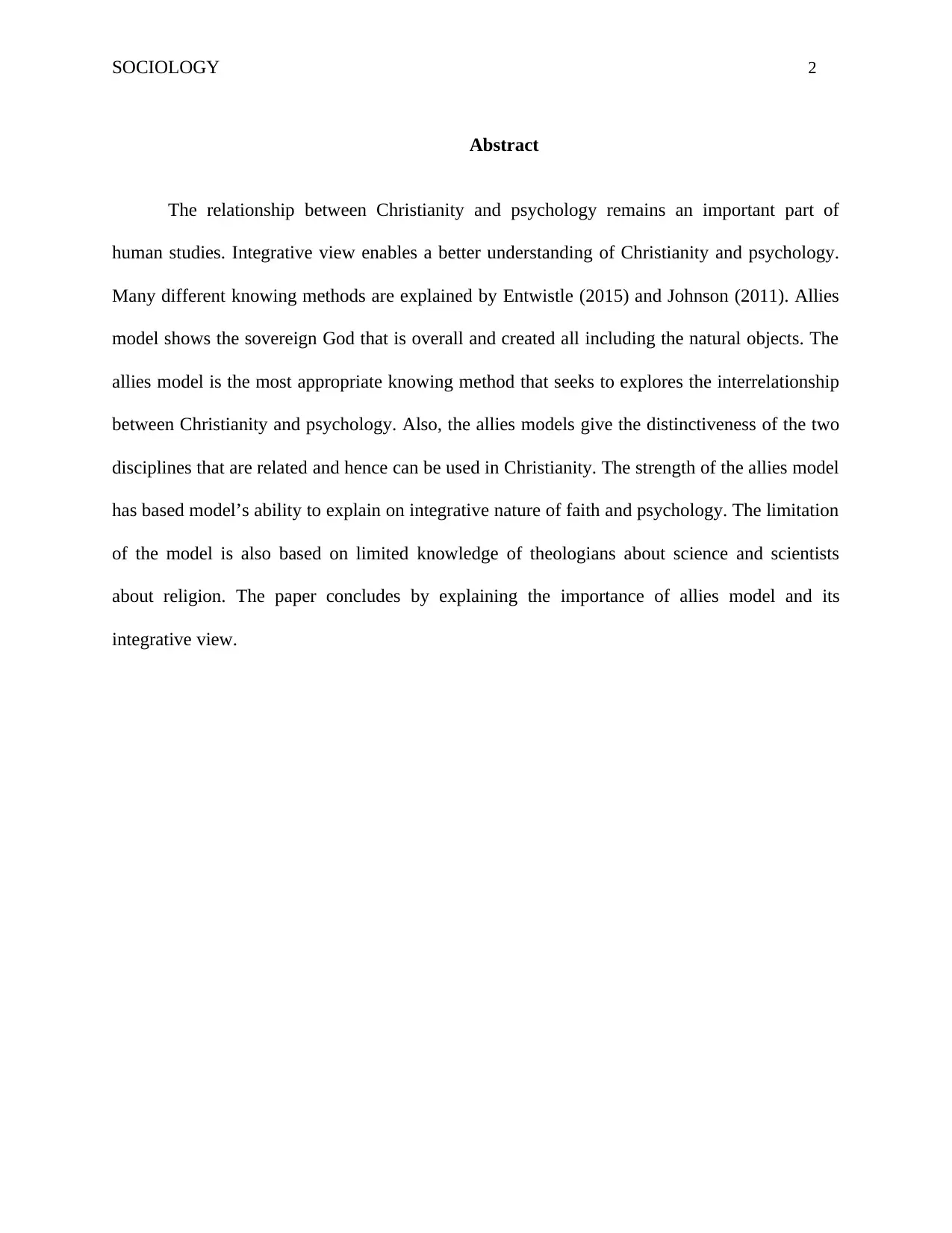
SOCIOLOGY 2
Abstract
The relationship between Christianity and psychology remains an important part of
human studies. Integrative view enables a better understanding of Christianity and psychology.
Many different knowing methods are explained by Entwistle (2015) and Johnson (2011). Allies
model shows the sovereign God that is overall and created all including the natural objects. The
allies model is the most appropriate knowing method that seeks to explores the interrelationship
between Christianity and psychology. Also, the allies models give the distinctiveness of the two
disciplines that are related and hence can be used in Christianity. The strength of the allies model
has based model’s ability to explain on integrative nature of faith and psychology. The limitation
of the model is also based on limited knowledge of theologians about science and scientists
about religion. The paper concludes by explaining the importance of allies model and its
integrative view.
Abstract
The relationship between Christianity and psychology remains an important part of
human studies. Integrative view enables a better understanding of Christianity and psychology.
Many different knowing methods are explained by Entwistle (2015) and Johnson (2011). Allies
model shows the sovereign God that is overall and created all including the natural objects. The
allies model is the most appropriate knowing method that seeks to explores the interrelationship
between Christianity and psychology. Also, the allies models give the distinctiveness of the two
disciplines that are related and hence can be used in Christianity. The strength of the allies model
has based model’s ability to explain on integrative nature of faith and psychology. The limitation
of the model is also based on limited knowledge of theologians about science and scientists
about religion. The paper concludes by explaining the importance of allies model and its
integrative view.
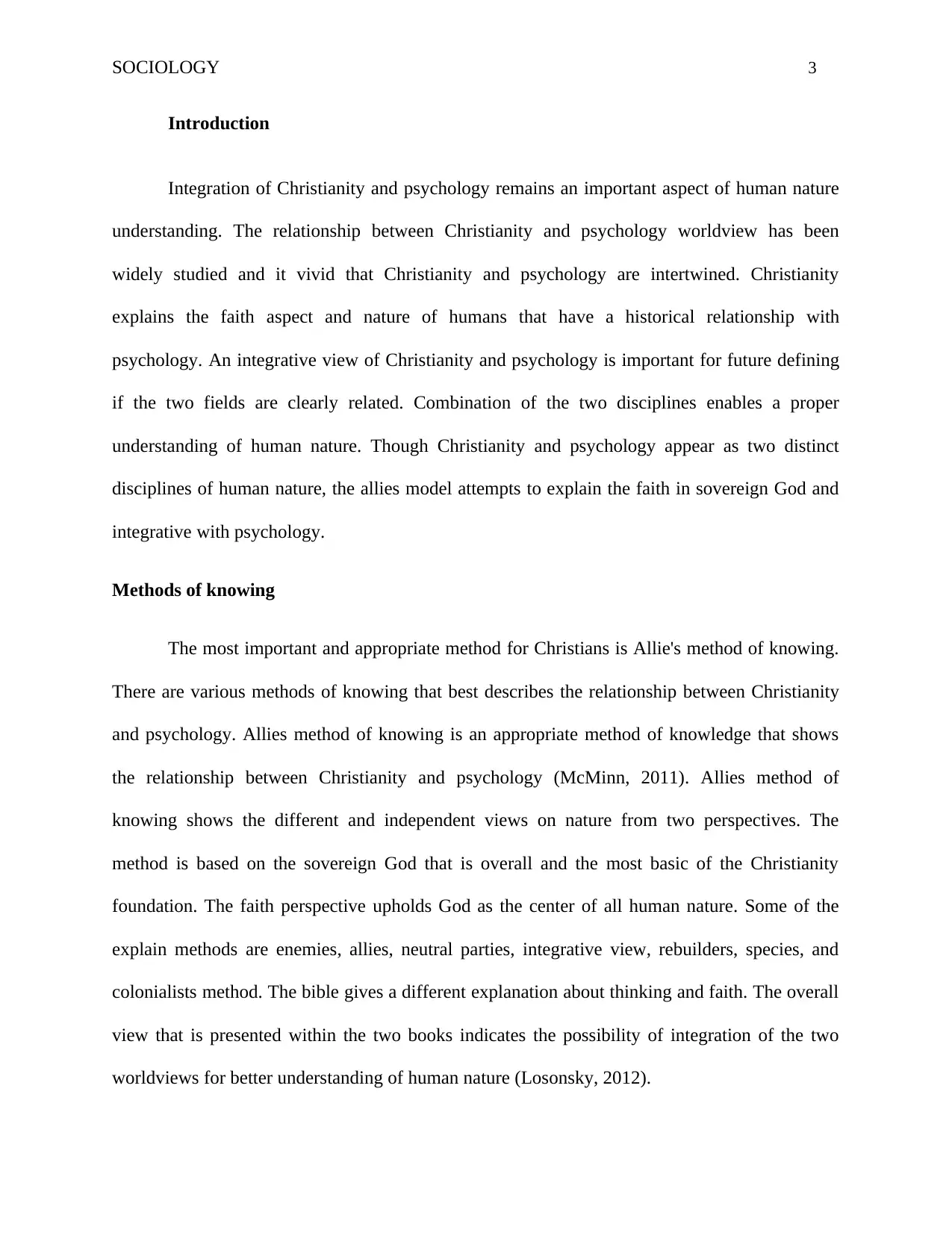
SOCIOLOGY 3
Introduction
Integration of Christianity and psychology remains an important aspect of human nature
understanding. The relationship between Christianity and psychology worldview has been
widely studied and it vivid that Christianity and psychology are intertwined. Christianity
explains the faith aspect and nature of humans that have a historical relationship with
psychology. An integrative view of Christianity and psychology is important for future defining
if the two fields are clearly related. Combination of the two disciplines enables a proper
understanding of human nature. Though Christianity and psychology appear as two distinct
disciplines of human nature, the allies model attempts to explain the faith in sovereign God and
integrative with psychology.
Methods of knowing
The most important and appropriate method for Christians is Allie's method of knowing.
There are various methods of knowing that best describes the relationship between Christianity
and psychology. Allies method of knowing is an appropriate method of knowledge that shows
the relationship between Christianity and psychology (McMinn, 2011). Allies method of
knowing shows the different and independent views on nature from two perspectives. The
method is based on the sovereign God that is overall and the most basic of the Christianity
foundation. The faith perspective upholds God as the center of all human nature. Some of the
explain methods are enemies, allies, neutral parties, integrative view, rebuilders, species, and
colonialists method. The bible gives a different explanation about thinking and faith. The overall
view that is presented within the two books indicates the possibility of integration of the two
worldviews for better understanding of human nature (Losonsky, 2012).
Introduction
Integration of Christianity and psychology remains an important aspect of human nature
understanding. The relationship between Christianity and psychology worldview has been
widely studied and it vivid that Christianity and psychology are intertwined. Christianity
explains the faith aspect and nature of humans that have a historical relationship with
psychology. An integrative view of Christianity and psychology is important for future defining
if the two fields are clearly related. Combination of the two disciplines enables a proper
understanding of human nature. Though Christianity and psychology appear as two distinct
disciplines of human nature, the allies model attempts to explain the faith in sovereign God and
integrative with psychology.
Methods of knowing
The most important and appropriate method for Christians is Allie's method of knowing.
There are various methods of knowing that best describes the relationship between Christianity
and psychology. Allies method of knowing is an appropriate method of knowledge that shows
the relationship between Christianity and psychology (McMinn, 2011). Allies method of
knowing shows the different and independent views on nature from two perspectives. The
method is based on the sovereign God that is overall and the most basic of the Christianity
foundation. The faith perspective upholds God as the center of all human nature. Some of the
explain methods are enemies, allies, neutral parties, integrative view, rebuilders, species, and
colonialists method. The bible gives a different explanation about thinking and faith. The overall
view that is presented within the two books indicates the possibility of integration of the two
worldviews for better understanding of human nature (Losonsky, 2012).
⊘ This is a preview!⊘
Do you want full access?
Subscribe today to unlock all pages.

Trusted by 1+ million students worldwide
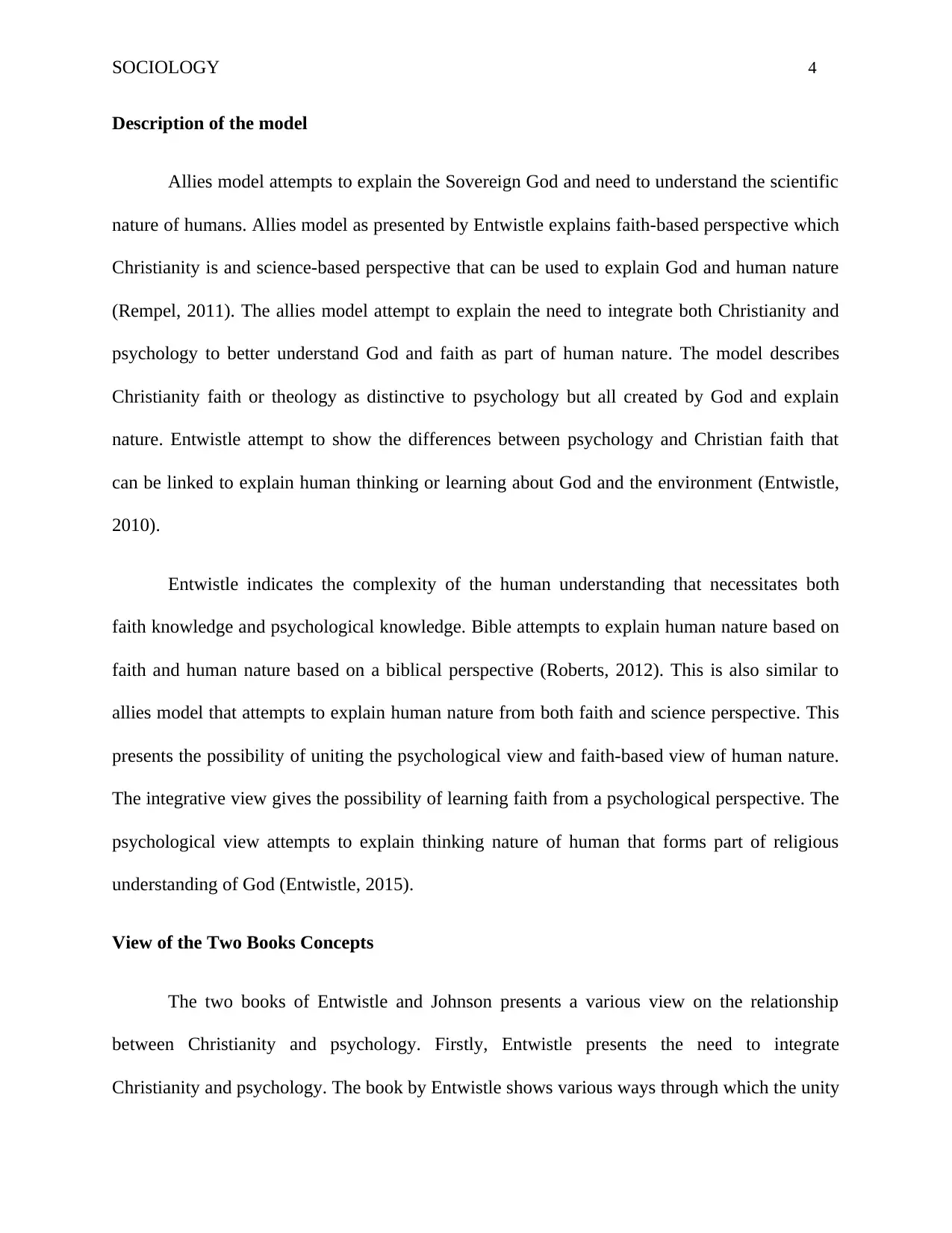
SOCIOLOGY 4
Description of the model
Allies model attempts to explain the Sovereign God and need to understand the scientific
nature of humans. Allies model as presented by Entwistle explains faith-based perspective which
Christianity is and science-based perspective that can be used to explain God and human nature
(Rempel, 2011). The allies model attempt to explain the need to integrate both Christianity and
psychology to better understand God and faith as part of human nature. The model describes
Christianity faith or theology as distinctive to psychology but all created by God and explain
nature. Entwistle attempt to show the differences between psychology and Christian faith that
can be linked to explain human thinking or learning about God and the environment (Entwistle,
2010).
Entwistle indicates the complexity of the human understanding that necessitates both
faith knowledge and psychological knowledge. Bible attempts to explain human nature based on
faith and human nature based on a biblical perspective (Roberts, 2012). This is also similar to
allies model that attempts to explain human nature from both faith and science perspective. This
presents the possibility of uniting the psychological view and faith-based view of human nature.
The integrative view gives the possibility of learning faith from a psychological perspective. The
psychological view attempts to explain thinking nature of human that forms part of religious
understanding of God (Entwistle, 2015).
View of the Two Books Concepts
The two books of Entwistle and Johnson presents a various view on the relationship
between Christianity and psychology. Firstly, Entwistle presents the need to integrate
Christianity and psychology. The book by Entwistle shows various ways through which the unity
Description of the model
Allies model attempts to explain the Sovereign God and need to understand the scientific
nature of humans. Allies model as presented by Entwistle explains faith-based perspective which
Christianity is and science-based perspective that can be used to explain God and human nature
(Rempel, 2011). The allies model attempt to explain the need to integrate both Christianity and
psychology to better understand God and faith as part of human nature. The model describes
Christianity faith or theology as distinctive to psychology but all created by God and explain
nature. Entwistle attempt to show the differences between psychology and Christian faith that
can be linked to explain human thinking or learning about God and the environment (Entwistle,
2010).
Entwistle indicates the complexity of the human understanding that necessitates both
faith knowledge and psychological knowledge. Bible attempts to explain human nature based on
faith and human nature based on a biblical perspective (Roberts, 2012). This is also similar to
allies model that attempts to explain human nature from both faith and science perspective. This
presents the possibility of uniting the psychological view and faith-based view of human nature.
The integrative view gives the possibility of learning faith from a psychological perspective. The
psychological view attempts to explain thinking nature of human that forms part of religious
understanding of God (Entwistle, 2015).
View of the Two Books Concepts
The two books of Entwistle and Johnson presents a various view on the relationship
between Christianity and psychology. Firstly, Entwistle presents the need to integrate
Christianity and psychology. The book by Entwistle shows various ways through which the unity
Paraphrase This Document
Need a fresh take? Get an instant paraphrase of this document with our AI Paraphraser
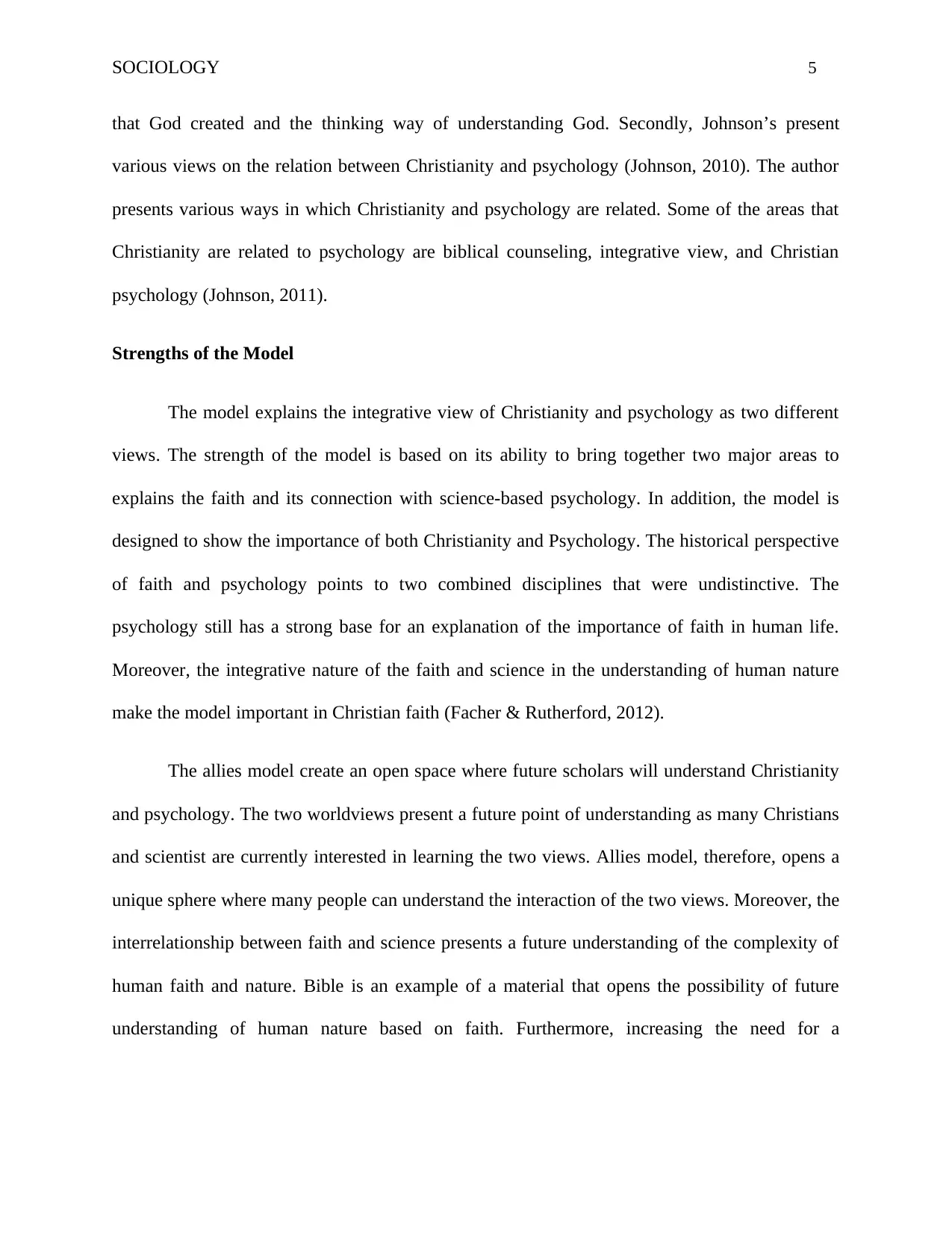
SOCIOLOGY 5
that God created and the thinking way of understanding God. Secondly, Johnson’s present
various views on the relation between Christianity and psychology (Johnson, 2010). The author
presents various ways in which Christianity and psychology are related. Some of the areas that
Christianity are related to psychology are biblical counseling, integrative view, and Christian
psychology (Johnson, 2011).
Strengths of the Model
The model explains the integrative view of Christianity and psychology as two different
views. The strength of the model is based on its ability to bring together two major areas to
explains the faith and its connection with science-based psychology. In addition, the model is
designed to show the importance of both Christianity and Psychology. The historical perspective
of faith and psychology points to two combined disciplines that were undistinctive. The
psychology still has a strong base for an explanation of the importance of faith in human life.
Moreover, the integrative nature of the faith and science in the understanding of human nature
make the model important in Christian faith (Facher & Rutherford, 2012).
The allies model create an open space where future scholars will understand Christianity
and psychology. The two worldviews present a future point of understanding as many Christians
and scientist are currently interested in learning the two views. Allies model, therefore, opens a
unique sphere where many people can understand the interaction of the two views. Moreover, the
interrelationship between faith and science presents a future understanding of the complexity of
human faith and nature. Bible is an example of a material that opens the possibility of future
understanding of human nature based on faith. Furthermore, increasing the need for a
that God created and the thinking way of understanding God. Secondly, Johnson’s present
various views on the relation between Christianity and psychology (Johnson, 2010). The author
presents various ways in which Christianity and psychology are related. Some of the areas that
Christianity are related to psychology are biblical counseling, integrative view, and Christian
psychology (Johnson, 2011).
Strengths of the Model
The model explains the integrative view of Christianity and psychology as two different
views. The strength of the model is based on its ability to bring together two major areas to
explains the faith and its connection with science-based psychology. In addition, the model is
designed to show the importance of both Christianity and Psychology. The historical perspective
of faith and psychology points to two combined disciplines that were undistinctive. The
psychology still has a strong base for an explanation of the importance of faith in human life.
Moreover, the integrative nature of the faith and science in the understanding of human nature
make the model important in Christian faith (Facher & Rutherford, 2012).
The allies model create an open space where future scholars will understand Christianity
and psychology. The two worldviews present a future point of understanding as many Christians
and scientist are currently interested in learning the two views. Allies model, therefore, opens a
unique sphere where many people can understand the interaction of the two views. Moreover, the
interrelationship between faith and science presents a future understanding of the complexity of
human faith and nature. Bible is an example of a material that opens the possibility of future
understanding of human nature based on faith. Furthermore, increasing the need for a
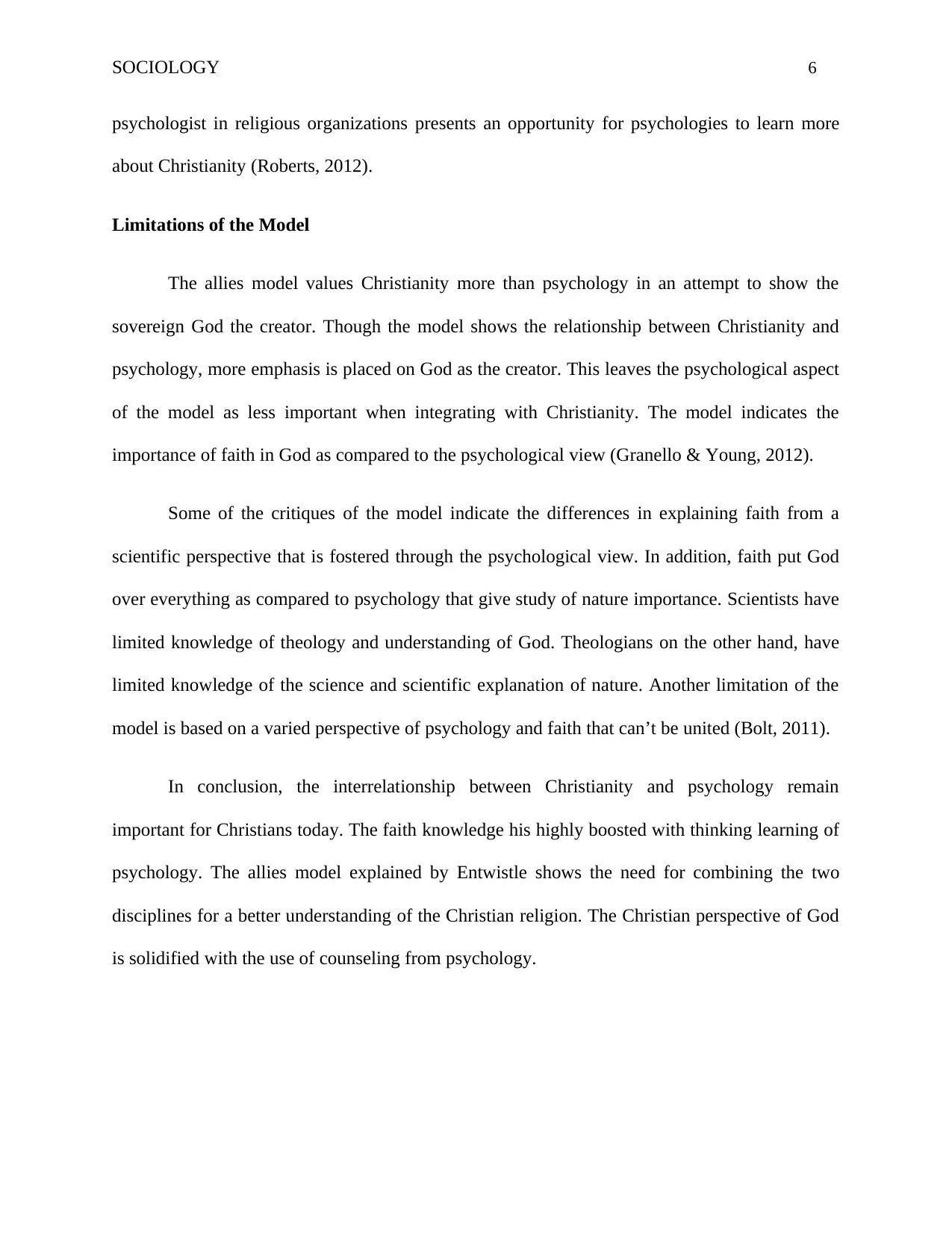
SOCIOLOGY 6
psychologist in religious organizations presents an opportunity for psychologies to learn more
about Christianity (Roberts, 2012).
Limitations of the Model
The allies model values Christianity more than psychology in an attempt to show the
sovereign God the creator. Though the model shows the relationship between Christianity and
psychology, more emphasis is placed on God as the creator. This leaves the psychological aspect
of the model as less important when integrating with Christianity. The model indicates the
importance of faith in God as compared to the psychological view (Granello & Young, 2012).
Some of the critiques of the model indicate the differences in explaining faith from a
scientific perspective that is fostered through the psychological view. In addition, faith put God
over everything as compared to psychology that give study of nature importance. Scientists have
limited knowledge of theology and understanding of God. Theologians on the other hand, have
limited knowledge of the science and scientific explanation of nature. Another limitation of the
model is based on a varied perspective of psychology and faith that can’t be united (Bolt, 2011).
In conclusion, the interrelationship between Christianity and psychology remain
important for Christians today. The faith knowledge his highly boosted with thinking learning of
psychology. The allies model explained by Entwistle shows the need for combining the two
disciplines for a better understanding of the Christian religion. The Christian perspective of God
is solidified with the use of counseling from psychology.
psychologist in religious organizations presents an opportunity for psychologies to learn more
about Christianity (Roberts, 2012).
Limitations of the Model
The allies model values Christianity more than psychology in an attempt to show the
sovereign God the creator. Though the model shows the relationship between Christianity and
psychology, more emphasis is placed on God as the creator. This leaves the psychological aspect
of the model as less important when integrating with Christianity. The model indicates the
importance of faith in God as compared to the psychological view (Granello & Young, 2012).
Some of the critiques of the model indicate the differences in explaining faith from a
scientific perspective that is fostered through the psychological view. In addition, faith put God
over everything as compared to psychology that give study of nature importance. Scientists have
limited knowledge of theology and understanding of God. Theologians on the other hand, have
limited knowledge of the science and scientific explanation of nature. Another limitation of the
model is based on a varied perspective of psychology and faith that can’t be united (Bolt, 2011).
In conclusion, the interrelationship between Christianity and psychology remain
important for Christians today. The faith knowledge his highly boosted with thinking learning of
psychology. The allies model explained by Entwistle shows the need for combining the two
disciplines for a better understanding of the Christian religion. The Christian perspective of God
is solidified with the use of counseling from psychology.
⊘ This is a preview!⊘
Do you want full access?
Subscribe today to unlock all pages.

Trusted by 1+ million students worldwide
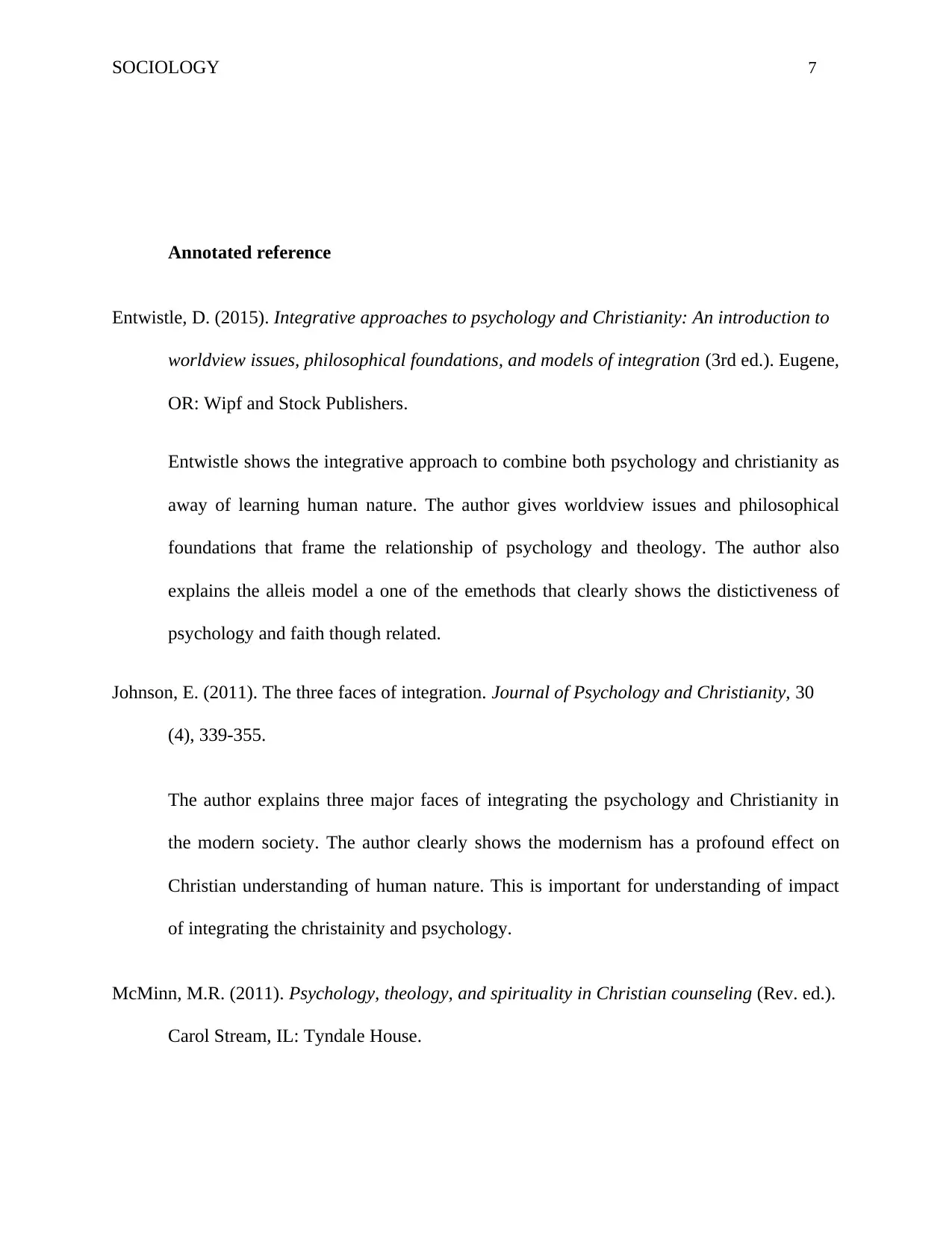
SOCIOLOGY 7
Annotated reference
Entwistle, D. (2015). Integrative approaches to psychology and Christianity: An introduction to
worldview issues, philosophical foundations, and models of integration (3rd ed.). Eugene,
OR: Wipf and Stock Publishers.
Entwistle shows the integrative approach to combine both psychology and christianity as
away of learning human nature. The author gives worldview issues and philosophical
foundations that frame the relationship of psychology and theology. The author also
explains the alleis model a one of the emethods that clearly shows the distictiveness of
psychology and faith though related.
Johnson, E. (2011). The three faces of integration. Journal of Psychology and Christianity, 30
(4), 339-355.
The author explains three major faces of integrating the psychology and Christianity in
the modern society. The author clearly shows the modernism has a profound effect on
Christian understanding of human nature. This is important for understanding of impact
of integrating the christainity and psychology.
McMinn, M.R. (2011). Psychology, theology, and spirituality in Christian counseling (Rev. ed.).
Carol Stream, IL: Tyndale House.
Annotated reference
Entwistle, D. (2015). Integrative approaches to psychology and Christianity: An introduction to
worldview issues, philosophical foundations, and models of integration (3rd ed.). Eugene,
OR: Wipf and Stock Publishers.
Entwistle shows the integrative approach to combine both psychology and christianity as
away of learning human nature. The author gives worldview issues and philosophical
foundations that frame the relationship of psychology and theology. The author also
explains the alleis model a one of the emethods that clearly shows the distictiveness of
psychology and faith though related.
Johnson, E. (2011). The three faces of integration. Journal of Psychology and Christianity, 30
(4), 339-355.
The author explains three major faces of integrating the psychology and Christianity in
the modern society. The author clearly shows the modernism has a profound effect on
Christian understanding of human nature. This is important for understanding of impact
of integrating the christainity and psychology.
McMinn, M.R. (2011). Psychology, theology, and spirituality in Christian counseling (Rev. ed.).
Carol Stream, IL: Tyndale House.
Paraphrase This Document
Need a fresh take? Get an instant paraphrase of this document with our AI Paraphraser
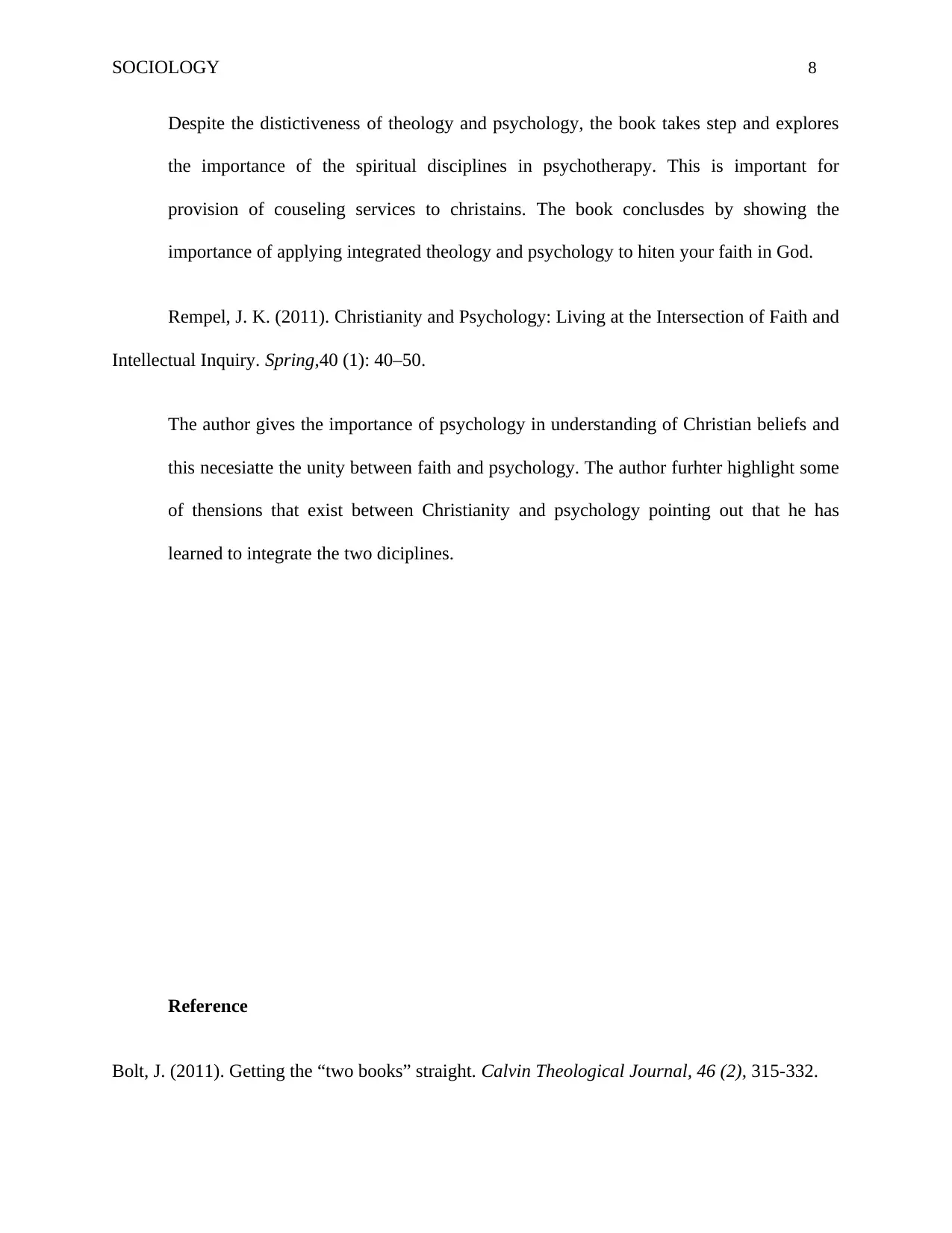
SOCIOLOGY 8
Despite the distictiveness of theology and psychology, the book takes step and explores
the importance of the spiritual disciplines in psychotherapy. This is important for
provision of couseling services to christains. The book conclusdes by showing the
importance of applying integrated theology and psychology to hiten your faith in God.
Rempel, J. K. (2011). Christianity and Psychology: Living at the Intersection of Faith and
Intellectual Inquiry. Spring,40 (1): 40–50.
The author gives the importance of psychology in understanding of Christian beliefs and
this necesiatte the unity between faith and psychology. The author furhter highlight some
of thensions that exist between Christianity and psychology pointing out that he has
learned to integrate the two diciplines.
Reference
Bolt, J. (2011). Getting the “two books” straight. Calvin Theological Journal, 46 (2), 315-332.
Despite the distictiveness of theology and psychology, the book takes step and explores
the importance of the spiritual disciplines in psychotherapy. This is important for
provision of couseling services to christains. The book conclusdes by showing the
importance of applying integrated theology and psychology to hiten your faith in God.
Rempel, J. K. (2011). Christianity and Psychology: Living at the Intersection of Faith and
Intellectual Inquiry. Spring,40 (1): 40–50.
The author gives the importance of psychology in understanding of Christian beliefs and
this necesiatte the unity between faith and psychology. The author furhter highlight some
of thensions that exist between Christianity and psychology pointing out that he has
learned to integrate the two diciplines.
Reference
Bolt, J. (2011). Getting the “two books” straight. Calvin Theological Journal, 46 (2), 315-332.
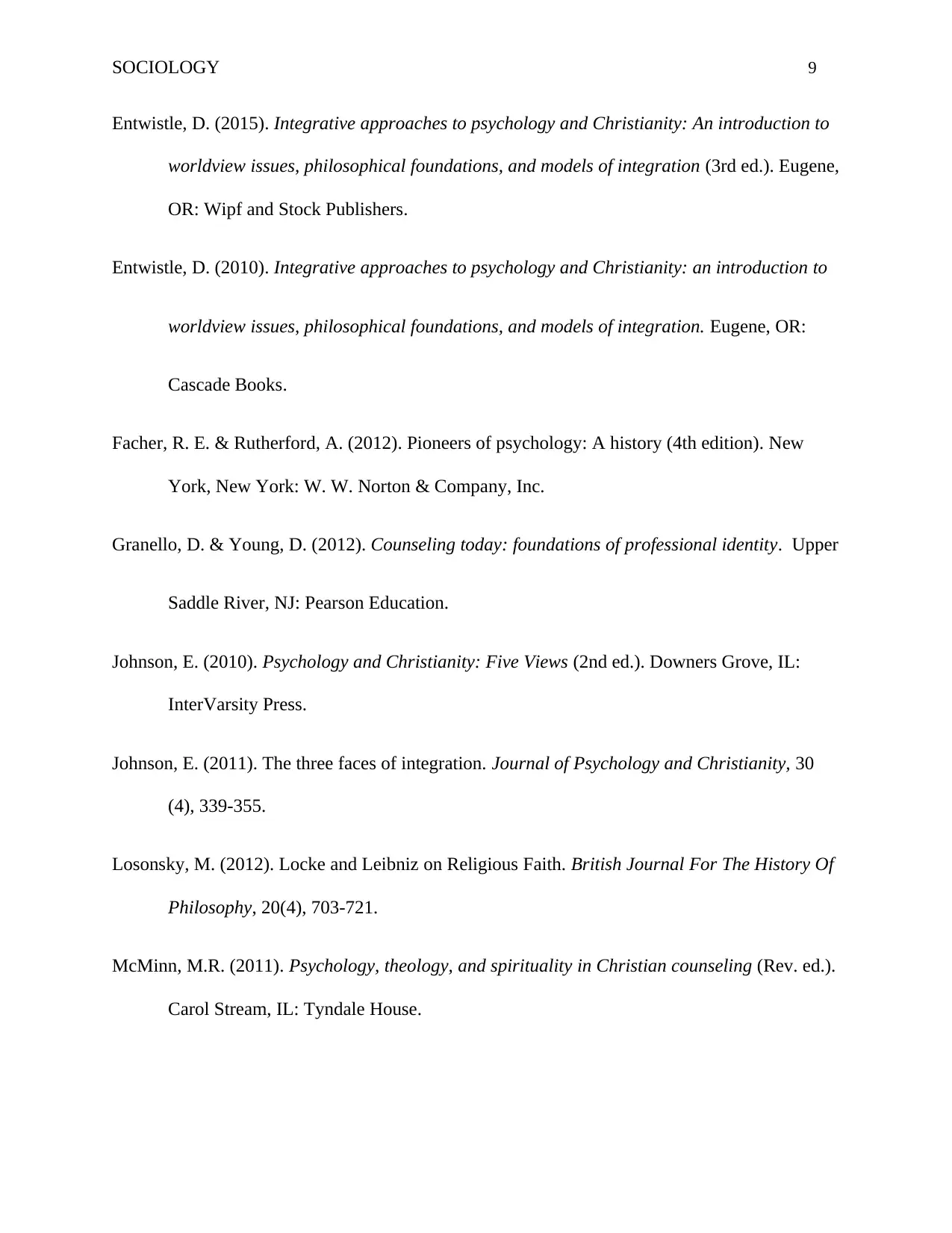
SOCIOLOGY 9
Entwistle, D. (2015). Integrative approaches to psychology and Christianity: An introduction to
worldview issues, philosophical foundations, and models of integration (3rd ed.). Eugene,
OR: Wipf and Stock Publishers.
Entwistle, D. (2010). Integrative approaches to psychology and Christianity: an introduction to
worldview issues, philosophical foundations, and models of integration. Eugene, OR:
Cascade Books.
Facher, R. E. & Rutherford, A. (2012). Pioneers of psychology: A history (4th edition). New
York, New York: W. W. Norton & Company, Inc.
Granello, D. & Young, D. (2012). Counseling today: foundations of professional identity. Upper
Saddle River, NJ: Pearson Education.
Johnson, E. (2010). Psychology and Christianity: Five Views (2nd ed.). Downers Grove, IL:
InterVarsity Press.
Johnson, E. (2011). The three faces of integration. Journal of Psychology and Christianity, 30
(4), 339-355.
Losonsky, M. (2012). Locke and Leibniz on Religious Faith. British Journal For The History Of
Philosophy, 20(4), 703-721.
McMinn, M.R. (2011). Psychology, theology, and spirituality in Christian counseling (Rev. ed.).
Carol Stream, IL: Tyndale House.
Entwistle, D. (2015). Integrative approaches to psychology and Christianity: An introduction to
worldview issues, philosophical foundations, and models of integration (3rd ed.). Eugene,
OR: Wipf and Stock Publishers.
Entwistle, D. (2010). Integrative approaches to psychology and Christianity: an introduction to
worldview issues, philosophical foundations, and models of integration. Eugene, OR:
Cascade Books.
Facher, R. E. & Rutherford, A. (2012). Pioneers of psychology: A history (4th edition). New
York, New York: W. W. Norton & Company, Inc.
Granello, D. & Young, D. (2012). Counseling today: foundations of professional identity. Upper
Saddle River, NJ: Pearson Education.
Johnson, E. (2010). Psychology and Christianity: Five Views (2nd ed.). Downers Grove, IL:
InterVarsity Press.
Johnson, E. (2011). The three faces of integration. Journal of Psychology and Christianity, 30
(4), 339-355.
Losonsky, M. (2012). Locke and Leibniz on Religious Faith. British Journal For The History Of
Philosophy, 20(4), 703-721.
McMinn, M.R. (2011). Psychology, theology, and spirituality in Christian counseling (Rev. ed.).
Carol Stream, IL: Tyndale House.
⊘ This is a preview!⊘
Do you want full access?
Subscribe today to unlock all pages.

Trusted by 1+ million students worldwide
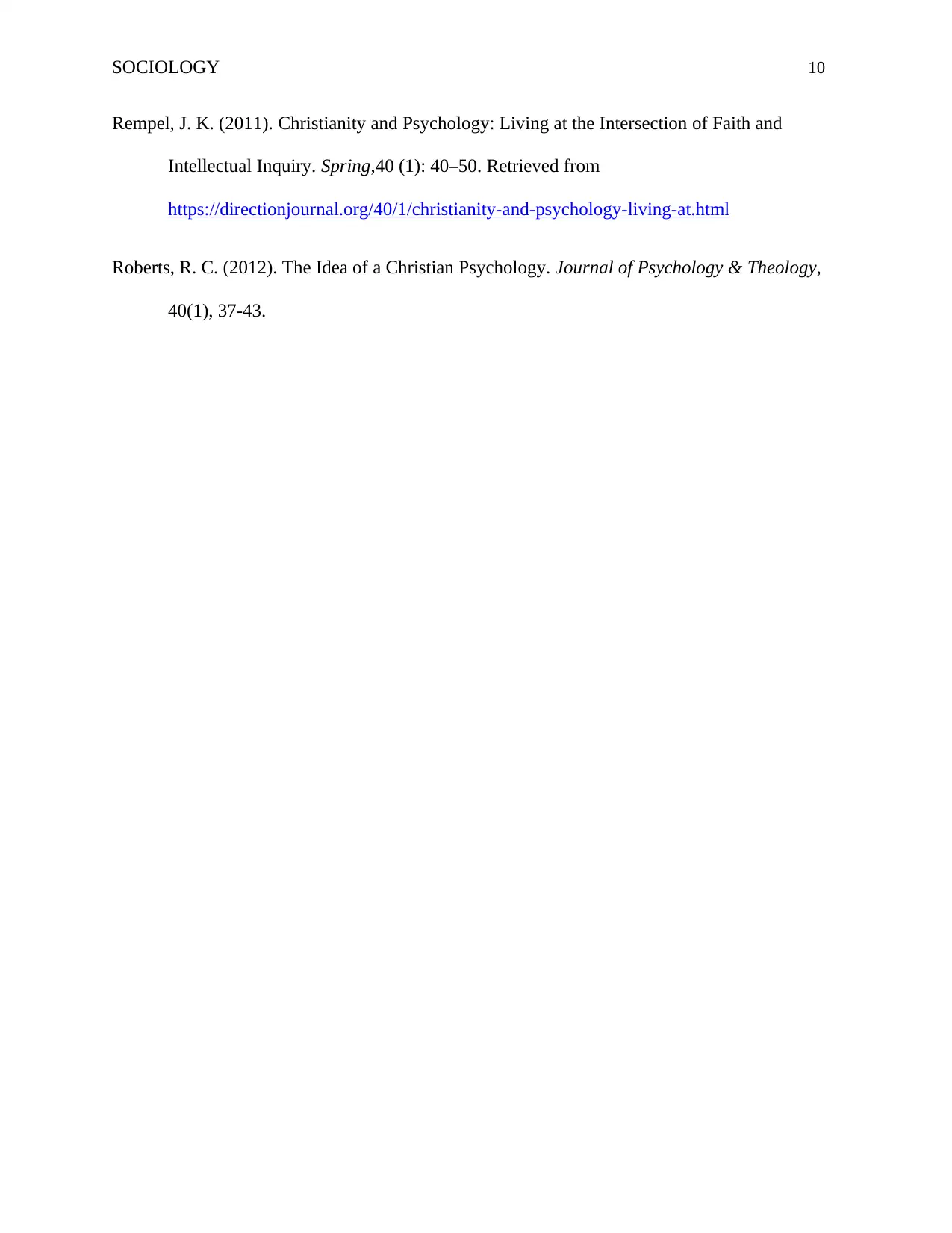
SOCIOLOGY 10
Rempel, J. K. (2011). Christianity and Psychology: Living at the Intersection of Faith and
Intellectual Inquiry. Spring,40 (1): 40–50. Retrieved from
https://directionjournal.org/40/1/christianity-and-psychology-living-at.html
Roberts, R. C. (2012). The Idea of a Christian Psychology. Journal of Psychology & Theology,
40(1), 37-43.
Rempel, J. K. (2011). Christianity and Psychology: Living at the Intersection of Faith and
Intellectual Inquiry. Spring,40 (1): 40–50. Retrieved from
https://directionjournal.org/40/1/christianity-and-psychology-living-at.html
Roberts, R. C. (2012). The Idea of a Christian Psychology. Journal of Psychology & Theology,
40(1), 37-43.
1 out of 10
Related Documents
Your All-in-One AI-Powered Toolkit for Academic Success.
+13062052269
info@desklib.com
Available 24*7 on WhatsApp / Email
![[object Object]](/_next/static/media/star-bottom.7253800d.svg)
Unlock your academic potential
Copyright © 2020–2025 A2Z Services. All Rights Reserved. Developed and managed by ZUCOL.





